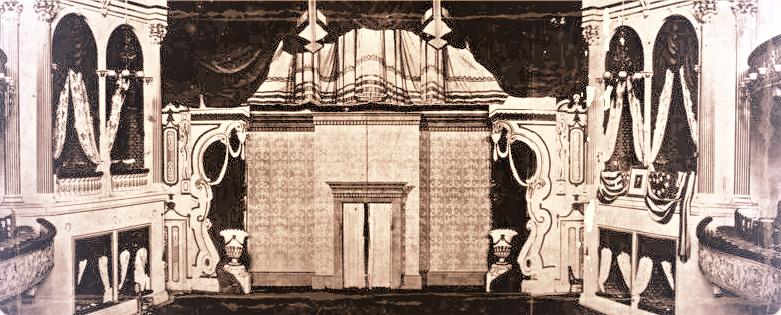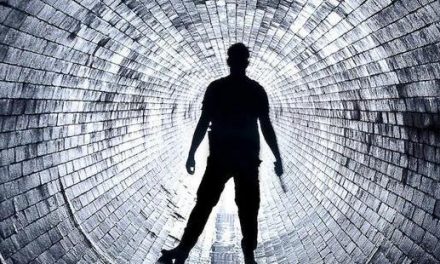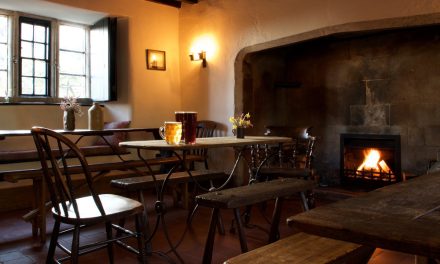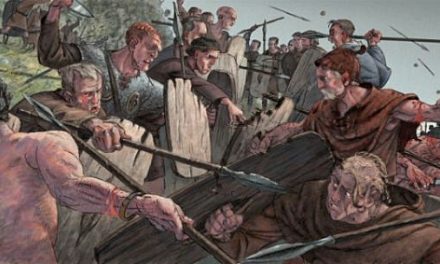Approaching the foreboding, Victorian-era opera house that remained all but invisible to mortal eyes, the small contingent of Sonoma County vampires felt increasingly unnerved. With broken windows hanging open to the night air and paint peeling off in sheets, the building looked like it hadn’t seen a touch of maintenance or renovation since its heyday. The wide entrance doors hung open, creaking eerily in the breezy San Francisco night air, and with a deep breath to steady himself, Prince William O’Keefe lead his officers into the dark.
The building’s once-opulent interior looked like it had received no more care or compassion than its exterior, the stained and threadbare carpet scarcely a shadow of its former luster, rich mahogany trim and railings faded to a drab umber. Within the grand foyer, designed to host hundreds of the city’s old-world elite, the world was silent, unmoving. No sound from the midnight traffic just outside found their ears, and the vampires looked to each other wordlessly, nodding in silent agreement that they, too, were unnerved by the hauntingly empty theatre.
A heavy door near the main stairs opened, drawing everyone’s attention, a young Vietnamese child stepping into the twilight ambiance of the dusty hall. “This way,” he grinned maniacally, gesturing to the inky blackness from which he appeared. Several in the group were horrified – vampiric society, let alone common decency, forbade the embracing of children, making vampires out of those whose bodies and minds had not matured. O’Keefe frowned and shook his head, a sign to his officers more than from his own misgivings; not only were they guests in a foreign Domain, they were in the personal home of perhaps the oldest vampire in the Western United States. It was not their place to judge her actions or intentions – perhaps she had even sent the boy out as a test of their mettle.
Following the young man, dressed as a street urchin right out of Newsies or Oliver Twist, he lead the visitors up long flights of winding stairs, seemingly unhindered by the near-blackness of the unlit passage. Each of the guests’ plodding, blind footfalls billowed dust into the air, adding to a growing coat of dull gray that already clung to their fine clothes. Their guide didn’t slow or pause until the top landing, where small gas lamps illuminated sturdy, white doors. “She is within,” the child intoned, reaching high and taking hold of a large, brass doorknob.
Looking to each of his officers, the Prince received slight nods from each. Unnerved by the compoundingly stranger and stranger evening, let alone the potential of a meeting with Madame Opal herself, each of them had nevertheless committed to their cause, to support their Prince and their Domain, even if they fully didn’t understand the circumstances surrounding their visit. Emma, the most enigmatic kindred in Sonoma County, swallowed heavily before giving her assent; her bloodline was a powerful, mystical one, and she knew not what the creature beyond the door would demand from her. Where some vampires were strong or tough, others persuasive or blindingly fast, her Clan’s simultaneous gift and curse was insight. Like mythical Cassandra, full-warned of the future but unable to convince others, they saw true things no others did, but just as often bore witness to maddening possibilities and half-truths. To discount their advice was to invite disaster, but to fully embrace it with open arms was to guarantee ruin.
O’Keefe stepped forward and the young boy pulled the thick door open slowly, with effort. Silhouetted against the low-flame gas lamps illuminating the stage far below stood a slight woman, hands resting upon the dust-covered balcony railing, waxy olive skin thin and lined from mortal age – Madame Opal had lived a full life even before she became a vampire. She stood, not moving, staring down at the grand stage before her. Silently, her guests entered the balcony, and the door closed heavily behind them, sealing them inside. They were alone with the Lady.
The performance hall was in no better condition than the rest of the opera house, other than being dimly lit by flickering orange light. Wooden boards had split and splintered, heavy velvet curtains torn and threatening to pull from their hangers. At some point in the building’s long history a spotlight had fallen from the ceiling, crashing through the stage, leaving a blasted hole in its wake. The stage had not hosted a performance in over a century, and yet Madame Opal’s stony gaze was transfixed upon it, as if watching a grand spectacle come to life. She seemed to ignore her guests completely.
They waited.















